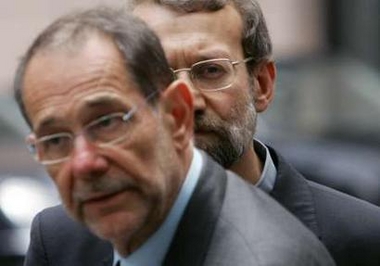Iran rejects deadline at EU nuclear talks
(Reuters)
Updated: 2006-07-11 21:03
Iran's chief nuclear negotiator rebuffed Western pressure for an immediate
answer to an offer of incentives to suspend uranium enrichment ahead of crucial
talks with the European Union on Tuesday.

Iran's chief nuclear
negotiator Ali Larijani and European Union foreign policy chief Javier
Solana (L) leave a news conference at the European Council in Brussels
July 11, 2006. [Reuters] |
The United States, which accuses Tehran of secretly working to build nuclear
weapons, has demanded a clear Iranian response before next weekend's summit of
Group of Eight industrialized nations in Russia or face possible U.N. Security
Council action.
But Ali Larijani told reporters before he met EU foreign policy chief Javier
Solana for a second round of talks in five days: "We have expressed our view
regarding the deadline. We are not used to acting before thinking."
Iran has said it will reply in late August to a package of technology,
economic and political sweeteners, and an Iranian foreign ministry spokesman
suggested its full answer would only emerge later during detailed negotiations
on the offer.
"Iran's answer will not be given suddenly. The answers will be given during
the negotiations," Foreign Ministry spokesman Hamid Reza Asefi was quoted as
saying by state radio, adding Tehran saw "ambiguities" in all three areas of the
package.
An Iranian deputy foreign minister said Iran was not considering freezing its
uranium enrichment activities as part of a solution.
"We did it before, we did it for two and a half years. It proved that it
didn't work," Manuchehr Mohammadi said on a visit to China. "Nothing came as the
fruitful and useful conclusion."
Mohammadi said Iran was optimistic about what he called Western "flexibility"
over the incentives, but warned that any resort to sanctions would be
counter-productive.
Diplomats say Russia and China, both veto-holders in the U.N. Security
Council, are wary about imposing sanctions on Tehran and so acknowledge there is
little pressure on Iran to give an early reply to the offer presented by Solana
on June 6.
Outside the talks, some 60 supporters of the exiled Iranian opposition waved
banners urging "U.N. sanctions to stop the game of the mullahs," insisting
Tehran was not interested in solving the dispute and was merely playing for
time.
|